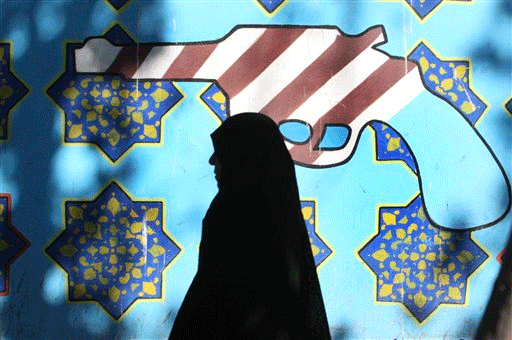
November 4, 2011: An Iranian woman walks past an anti-U.S. mural, painted on the wall of the former U.S. Embassy in Tehran at the side lines of an annual state-backed rally, marking the anniversary of the seizure of the U.S. Embassy by militant students on Nov. 4, 1979, when militant Iranian students who believed the embassy was a center of plots against the Persian country held 52 Americans hostage for 444 days. (AP)
TEHRAN, Iran – New intelligence the U.N. atomic agency plans to release on alleged nuclear weapons work by Iran is fabricated, the Iranian foreign minister said Saturday.
Diplomats have told The Associated Press that the International Atomic Energy Agency plans to reveal intelligence in the coming week suggesting Iran made computer models of a nuclear warhead, as well as other previously undisclosed details on alleged secret work by Tehran on nuclear arms.
Foreign Minister Ali Akbar Salehi accused the IAEA of giving in to U.S. pressure to level accusations against Iran, which insists its nuclear program is only for peaceful aims like energy production.
"Iran has already responded to the alleged studies in 117 pages. We've said time and again that these are forgeries similar to faked notes," Salehi told a news conference in Tehran.
Salehi, Iran's former nuclear chief, asserted that allegations proven false in the past are being reproduced.
"The Americans raised documents like this in the past: the Niger scandal," he said, referring to claims -- based on a forgery -- that Iraq under Saddam Hussein had sought uranium from Niger.
"The documents were used as a pretext to invade Iraq," Salehi said. "After killing tens of thousands of innocent people, it was discovered that it was a forged document."
Iran has previously claimed that reports on alleged nuclear weapons activities were based on false information provided by a "few arrogant countries," a phrase authorities in Iran use to refer to the United States and its allies.
Salehi accused the IAEA of violating its neutrality and siding with U.S. intelligence claims under new agency chief Yukiya Amano, saying he is using information that his predecessor, Mohamed ElBaradei, said the agency could not authenticate independently.
"The IAEA should not do things under pressure. ... Iran's nuclear issue is not a technical or legal issue. It's a totally political case," Salehi said.
Iran has in the past dismissed investigations by the IAEA into the so-called Green Salt Project, which the U.S. alleged was an Iranian plan studying diverse components of a nuclear weapons program, including uranium enrichment and high explosives testing.
But Washington has refused to hand over the original documents to the IAEA and only presented a copy to the agency to support its claims. Iran has argued that U.S. reluctance to hand over original documents reinforces its assertion that they are forged.
Iran is already under U.N. sanctions for its refusal to halt uranium enrichment, a technology that can be used to produce reactor fuel or material for a warhead. Iran insists its nuclear work is only to produce energy and conduct peaceful scientific research.
